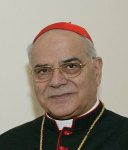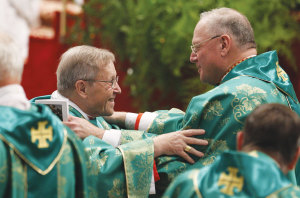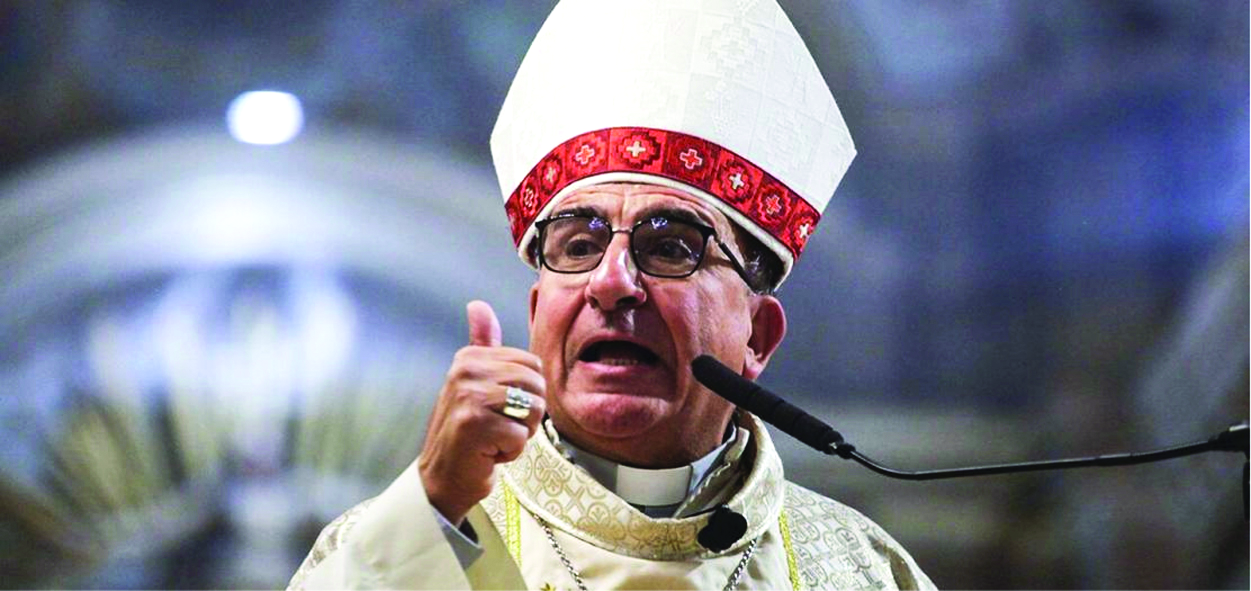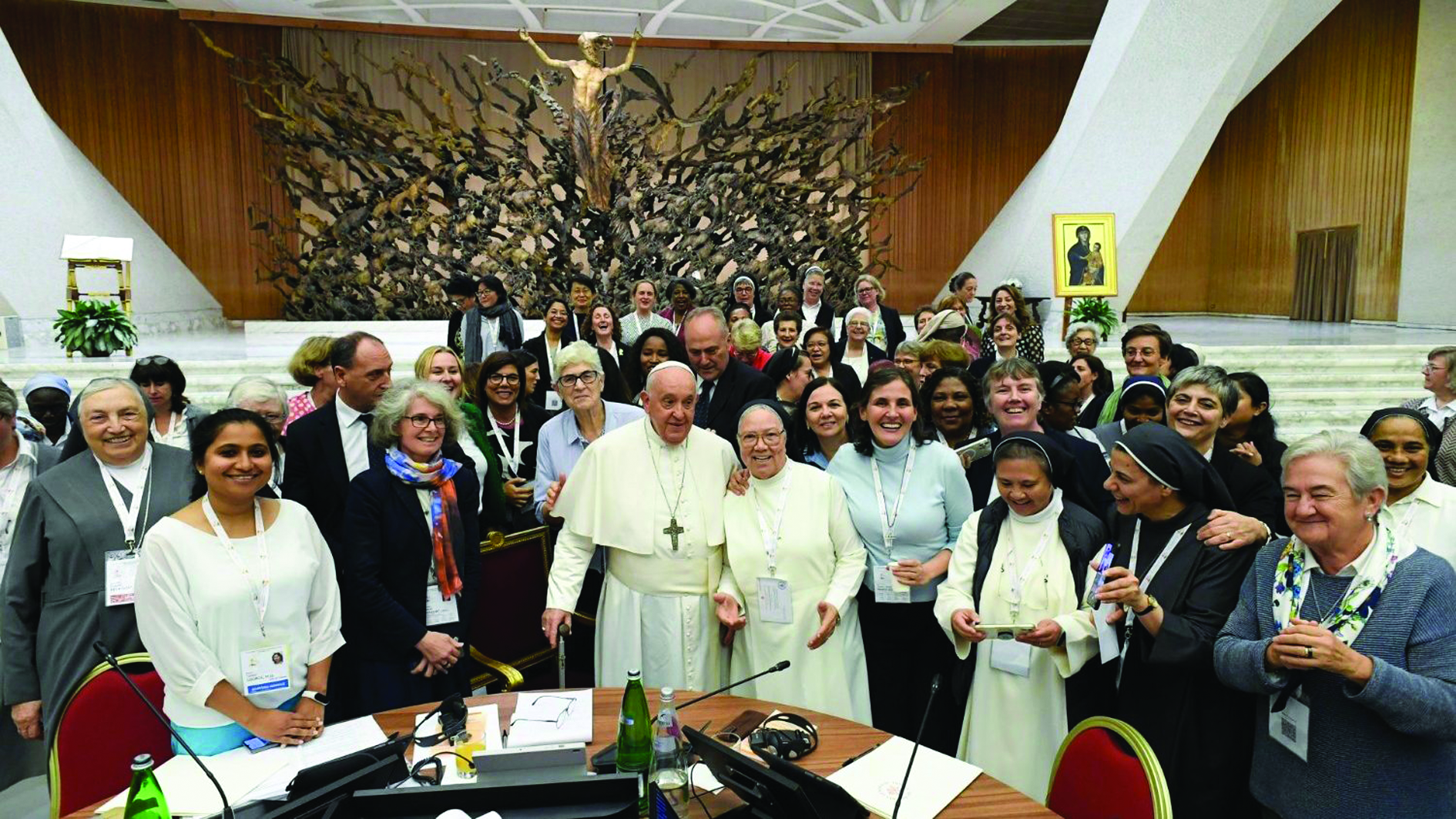
Cardinal Jose Saraiva Martins in the first row during the ceremony, quite near Pope Emeritus Benedict.
In a wide-ranging interview, Portuguese Cardinal José Saraiva Martins, retired Prefect of the Congregation for Saints, talks about the relationship of the two Popes, the Synod, and Europe…
Meeting with Portuguese Cardinal José Saraiva Martins, and having a conversation with him about any topic in the Catholic world, is always a privilege. This 83-year-old Prefect Emeritus of the Congregation for the Causes of Saints (and Rector Emeritus of the Pontifical Urban University) maintains an enviable clarity of judgment that stimulates any interlocutor into continuous reflections. Together we tried to bring into focus some of the topic that characterized Vatican life in 2014. Naturally, we could have delved into many other topics, such as the recent re-opening of ties between the United States and Cuba (a side note: the cardinal emphasized the Vatican’s long diplomatic preparation, and the first anti-embargo incentive given by John Paul II in his apostolic trip to the Caribbean island) or Pope Francis’ Christmas discourse to the Curia. Instead, we chose to focus on three other topics…
Your Eminence, summing up all that occurred in the Church in 2014 would be a complex and arduous task: there are so many subjects we could elaborate on, but in an interview (even a long one) there have to be limits, or we risk trying the readers’ patience. So let’s choose three main topics. The first springs from the wonderful, meaningful photo that you have here on your parlor table: Francis and Benedict XVI embracing in St. Peter’s, during the February 22, 2014 Consistory for the creation of new Cardinals. Incidentally, just behind the two figures in white, there is a third in purple-red, looking on with a satisfied air: you. As a Cardinal in the order of Bishops, thanks to the Cardinals’ hierarchy, you are sitting in the first row, close to none other than Joseph Ratzinger. Tell us, then, Your Eminence: does the embrace between the two men seal, without possibility of misinterpretation, the perfect coexistence in the Vatican, only a few yards apart from one another, of a reigning Pope and his predecessor? Realistically, this is something unimaginable until very recently, something that raised, and continues to raise, a host of questions…

Cardinal Jose Saraiva Martins.
Cardinal José Saraiva Martins: I can certainly vouch for the fact that the relationship between the reigning Pope and his predecessor is excellent. Their rapport is quite brotherly, with no contrasts between the two. Pope Francis has a great respect for Benedict XVI…
But some Catholics have conjured deep-seated contrasts between the two Popes, citing their extreme differences in pastoral action…
Saraiva Martins: It’s obvious that Francis is different than Benedict XVI. Each acts according to his own personality. The differences between them are not a danger, but rather something good, something that enriches the charisma of the papacy, because each brings his own unique experiences and qualities. St. Thomas Aquinas observed that every person acts according to his or her way of being. And he was completely right.
While differences in attitude are understandable, some other Catholics observe that between Francis and Benedict XVI there is a profound diversity of emphases…
Saraiva Martins: Underlining certain aspects more than one’s predecessor did is a positive addition to the wealth of complexity that is Catholicism. They are different expressions of the Church’s unique pastoral mission, different ways of making it concrete, based on the same Gospel.
May I continue? There are those who observe that Pope Francis’ absolute priority is to embrace the world… and Catholic doctrine will come into play only afterwards… For his predecessors, this didn’t seem to be the case…
Saraiva Martins: The ways of carrying out the Primacy of Peter are diverse. Embracing the world is certainly Pope Francis’ priority, but let’s beware: we are not talking about embracing the world superficially and sentimentally, but rather as the Successor of Peter! Besides, every Pope, in his own way, has tried to reach this goal. Here is an example: there are people who think or say or write that John XXIII and Pius XII were complete opposites…
And you don’t think so?
Saraiva Martins: No, they weren’t. And I’ll elaborate on that. John XXIII convened the Second Ecumenical Vatican Council, but the idea had been Pius XII’s. The latter had even nominated a commission to study the matter. But he was already getting on in years and his health started to fade, so the idea was put on the back burner. John XXIII brought it back to center stage and developed his immediate predecessor’s idea more completely. This disproves another popular yet erroneous concept: that Pius XII was against the idea of a Council. This is absolutely false. History must be read attentively. Pope Pacelli was profoundly pro-Council. In many of its parts, Vatican II did nothing more than take up and develop Pius XII’s line of thought, examining it in depth and applying it in the Church’s contingent reality. In fact, Pius XII is cited 64 times in the Council documents… So here we have two different ways of acting, but no doctrinal contrast whatsoever, between John XXIII and Pius XII!
Your Eminence, speaking of substantial continuity between a Pope and his predecessor… among your confreres or in the Church hierarchy, people continue to say and write that Francis has brought “a new air into the Church” and can be considered a “revolutionary.” And Revolution isn’t exactly continuity…
Saraiva Martins: The same was said during John XXIII’s time, about Pius XII, and during John Paul II’s time about Paul VI. The word “Revolution” should be understood thoroughly, and used with plenty of caution: to be sure, there are elements of the new in Francis’ pontificate, but these do not contradict what was carried out before him: rather, things are being developed under a new light. Pope Francis has emphasized, and emphasizes, “closeness to the sheep,” the idea that the shepherd must “smell” like his sheep. But this doesn’t mean that the other Popes were far from their flock: they just expressed this vocation in their own way.

An embrace between a “progressive” and a “conservative”: Cardinal Walter Kasper and Cardinal Timothy Dolan of New York.
Your Eminence, let’s move on to our second main topic: the first of the two Synods on the Family. In last October’s assemblies (and even earlier, in a sort of long electoral campaign) themes emerged that pointed to a great diversity of opinion, and not only among the Synod Fathers. We all know that, in the Assembly hall, the debates were lively, and even more so outside the hall, between the so-called “conservatives” and “innovators,” the latter of whom seemed — according to some — to enjoy the favor of important decision-makers. Then we all know how it ended, even though it is said that the comprehensive victory of the “conservatives” (who managed to have the intermediate reports radically modified) is not definitive at all. It is yet to be known how much weight this victory will carry into the October 2015 Synod, considering especially the content of the second questionnaire distributed to the dioceses…
Saraiva Martins: Here, too, we need to pay close attention to the way certain terms are used. We can speak of “conservatives” and “innovators,” but we need to remember that the two are not in contrast with one another. Commonly, “conservatives” are those who accentuate the importance of doctrine, while “innovators” emphasize the objectification of that doctrine in the context of our current historical situation. These two tendencies, together, sum up the two fundamental principles of today’s pastoral action.
I don’t deny that differing opinions have emerged here, the way they did during Vatican II, but these kinds of differences, if well-intended, are a good thing: they enhance the Church.
So long as those differences don’t lead to exasperation…
Saraiva Martins: I don’t see that as being the case here. After all, we will be able to draw conclusions only after the second Synod on the Family, the ordinary one in October, 2015. Before that, any conclusions would be premature and out of place. We aren’t able to predict any outcome, also, because the make-up of the 2015 Synod will be different than the 2014 one: new Fathers will be introduced, and moreover most of the participants will be nominated by the many Bishops’ Conferences throughout the world, and therefore will be speaking in the name of their own respective Conferences. It is also true that the theme of pastoral care for families is at the heart of current debate throughout the Church, and the most important points are being analyzed: it is still in the middle of evolving. It all has do with living out the principles of doctrine, applying them to daily reality: the diversity of opinion applies only to the manner in which they should be carried out. The bottom line is clear: the Church needs to speak to the people of today, not to those of yesterday, nor to those of tomorrow.
The diversity of opinion on this subject has been upsetting more than a few Catholics. An apparent and perceived laissez-faire attitude concerning norms and regulations (not limited to the subject of pastoral care for families) lead a practicing Catholic in a square in Rome to ask me, “Now, with Pope Francis, is it still important to go to Mass every Sunday?” Your Eminence, what answer would you have given?
Saraiva Martins: I can comprehend the question, but the asker should clarify what it is based on. Has the Pope made any affirmation regarding this topic? No, I really don’t think he has. So the conclusion is logical.

Pope Francis addresses the European Parliament in Strasbourg, France, on November 25.
Returning to the subject of family pastoral care, here is another recent question I got from another practicing Catholic: “I agree that we should welcome, with human warmth, those who are living in irregular situations. But why should we give them specific roles in our parish communities? Why should we allow someone who is living publicly in a state of mortal sin to read at Mass? Or why should someone such as that be teaching catechism?” Here, too, Your Eminence, I would like to hear your reply.
Saraiva Martins: I need to await the Synod’s conclusions, which then need to be approved by the Pope, in order to give an adequate reply. For now we can observe that the Word of God is always just that, no matter who proclaims it. Or do we honestly think that it would lose any of its importance if it were proclaimed by a hardened sinner?
In other words, the contents of the Word always prevail over who is proclaiming it…
Saraiva Martins: A priest, even if he is a sinner, has the obligation of proclaiming the Word. It is the same for all Christian laypeople, no matter how sinful they may be. I can add that the Word “works” within the people who proclaim it, often inspiring them to ask questions and do some soul-searching, and hopefully leading them to modify their behavior. Naturally, one usually proclaims the Gospel by living it, but proclaiming it certainly does no harm even to a person living in a state of sin… the Spirit often chooses unimaginable ways to convert us! There are also special cases of divorced people, those who have had divorce imposed on them, against their will. We can hypothesize an example of a good catechist, say a woman, who is of great help to the pastor and the community, who was subjected to a divorce. One can reasonably ask whether it is right to deny her full participation in parish life, to continue carrying out her role as educator, a role she held with strong commitment before she went through divorce.
We have arrived at the third topic: on November 25, the Pope visited the European Parliament and the Council of Europe, giving two well-structured and very clear speeches which touched on many delicate points concerning the actions of these two institutions. His speeches were interrupted by applause several times, and at the end he was given a standing ovation by all the political factions in attendance. The fact is, that standing ovation doesn’t correspond to most of the decisions made by those institutions, concerning life, family and education. We can reflect, for example, on their obstinacy in spreading the ideology of gender throughout all sectors of society. And just a few days after the Pope’s European speeches, France’s Assemblée Nationale approved, by a large majority, a resolution affirming that abortion is a universal right…
Saraiva Martins: Unfortunately, this is a recurring contradiction, a sort of schizophrenia. Often an affirmation is applauded not for conviction, but for convenience. The facts confirm this. If a Parliament applauds the Pope’s words, and if it possessed a minimum of basic coherence, it would adopt pertinent decisions in its legislature. For example, the spreading of the ideology of gender is extremely negative for young people. We continue to complain about young people’s behavior, but what does society offer them? Already in preschool they are being taught gender ideology, and this provokes insecurity of identity and enormous psychological damage. Children must be educated, from the time they are very young, according to the constants of human principles, meaning Christian ones: they have to learn how to appreciate the basic values that make life beautiful. Above all, they need to learn these things in the family and at school. If this isn’t taking place, how can we be surprised at what is happening? Why should we cry crocodile tears when we see the moral drift of a part of the young generation, that was raised with certain relativistic and nihilistic ideologies? What sort of tomorrow are we offering today’s children? The choice of being male or female?
In our society of diluted morals, more and more people are subject to an insecurity of identity: this has been brought about deliberately, by bad teachers, unfortunately powerful…
Saraiva Martins: If I lack an identity, I can also wonder — not having found any reason that satisfies me — why I should even live. Life, death, everything and its opposite, are diluted into an outlook of enormous indifference. The majority of the problems faced by today’s youths springs from this.
Dear politicians, please realize that tomorrow’s society will be formed by today’s youth. Help it to be solid, and not liquid. To bring this about, defend and promote the family, the basic building block for a healthy society; and work towards schools that are profoundly human, teach the basics, and don’t contribute to diluted values whose consequences — as we have already begun to see —would be dramatic for humanity.






Facebook Comments